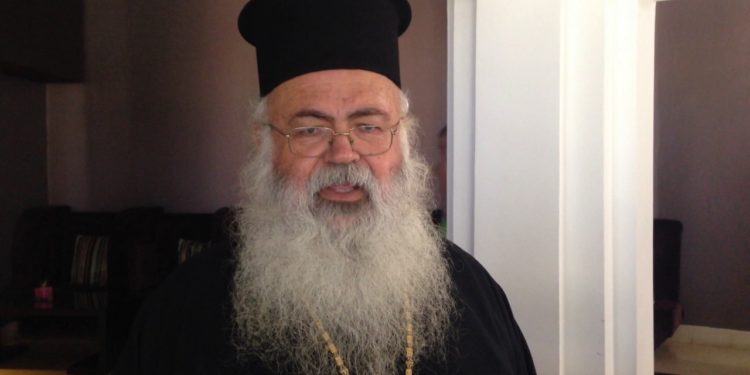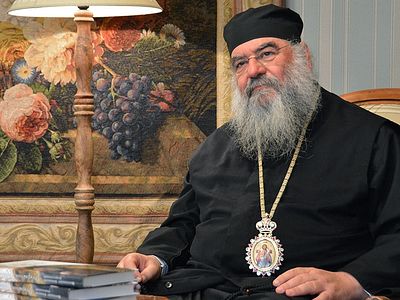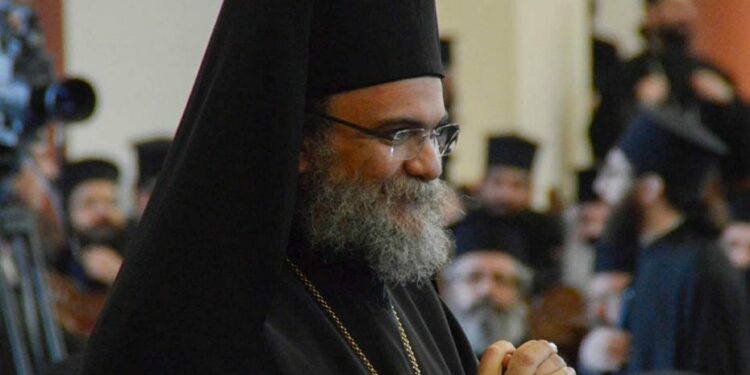Limassol bishop tops the poll but that’s no guarantee of victory
Skullduggery and wheeler-dealing. Welcome to the election campaign – not for president, but for archbishop. The race to elect a new primate of the church in Cyprus has gone into full swing and, although ‘favourites’ do exist, the outcome remains anyone’s guess.
There’s no limit on the number of candidates listed on the ballot. But in practice, the contenders should be less than a dozen. So far, seven top clerics have thrown their hat in the race – the bishops of Limassol Athanasios, Paphos Georgios, Tamasos Isaias, Constantia/Famagusta Vasilios, Karpasia Christoforos, Kyrenia Chrysostomos, and Morphou Neofytos.
The latest survey, published last Friday, gives Limassol’s Athanasios an unassailable lead at 34.7 per cent. Trailing him were Isaias at 17.1 per cent, Vasilios 12.3 per cent, Georgios 11.4 per cent, Neofytos 10.6 per cent, Christoforos 3.7 per cent, Chrysostomos 3.2 per cent.
Athanasios has a large group of ardent supporters, his bishopric is widely acknowledged as the best-oiled machine, with influence and access to parishes well beyond his ‘home base’ of Limassol.
So it looks like a cinch for Athanasios, in terms of making it to the final three. But if the last archbishop elections of 2006 are anything to go by, that by no means guarantees he’ll sit on the throne. In 2006, Chrysostomos of Paphos (the recently deceased archbishop) ranked last in the Holy Synod when proceedings got underway, but after a series of votes he somehow managed to come out on top.

Bishop Georgios of Paphos might dangle the Paphos bishopric to the ‘lesser’ bishops within the Holy Synod if they support him
By Tuesday, the official list of candidates for the vacated throne of archbishop will be finalised, so that their names and photographs can be printed out on the ballots which all Orthodox Christians can vote in. Under last-minute amendments to the church charter, the ballots will follow the same format and standard as in civilian elections. That wasn’t the case until a few days earlier, when the ‘ballot’ would have been a blank piece of paper on which people indicated, in their own handwriting, their cleric of choice. In addition, and unlike previously, interested parties must now formally submit their candidacy.
According to one observer speaking to the Cyprus Mail, and who preferred not to be named, these changes were made for practical reasons. First, people’s handwriting can be illegible or hard to read, and polling officers don’t need that extra hassle. Secondly, it raised a potential issue of privacy, as a person’s handwriting can be identified.
Also, civil servants will be posted at polling stations to serve as superintendents – replacing church officials who used to fulfill that role, and lending more credibility to the proceedings. All in, the archbishop elections will cost a cool €1 million – a preliminary assessment by Church Elections Commissioner Ioannis Charilaou.
Once the ballots are counted on election day on December 18, those top three clergymen garnering the most votes become the finalists for the throne – a kind of ‘triumvirate’.
Next, the Holy Synod will convene to elect an archbishop from among the three finalists. Currently, the Holy Synod comprises 17 members, including the archbishop. They will decide the winner by Christmas Eve.
A first round of voting is held in the Holy Synod, where if one of the three candidates acquires 50 per cent +1 of the votes (that is, 8 + 1 = 9) he is named archbishop. If not, a second round takes place, this time featuring the two of the three candidates who got the most votes in the first round. Again, the 50 per cent + 1 vote applies for the victor. If that still fails to yield a winner, he will be decided by simple lottery.
It follows on that whoever gets to sit on the throne, will ultimately depend on the balance of power and alliances within the Holy Synod. Still, the first stage – the popular vote – is far from a futile exercise, as it will determine the composition of the ‘triumvirate’, in turn shaping the dynamics inside the Holy Synod.
On the other hand, the chances of an ‘outsider’ – someone not a member of the Holy Synod – being one of the three finalists are slim to none. And a Holy Synod member who is one of the finalists, can vote for himself.
This past week, getting ahead of the game, a ‘Support Group’ for Athanasios held an event in Limassol. Attending were a number of local luminaries, including the mayor of the coastal city, municipal councilors, the head of the German Oncology Centre, and even administrators from the University of Technology (Tepak). There, backers waxed lyrical about the Limassol bishop, calling him “a spiritual beacon for us all.”
Supporting Athanasios are the ‘lesser’ bishops of Ledra/Maheras, Neapolis and Amathus. He is also well liked among students, thousands of whom have received financial support on academic scholarships.
Broadly speaking, the Holy Synod divides into two camps – those recognising the Church of Ukraine as an autocephalous (self-governing) church, and those opposing that. A vote on the matter was held within the Holy Synod, yielding a 9 to 7 result in favour of the former group.
The seven ‘dissidents’ were the bishops of Limassol, Tamasos, Morphou, Kykkos, Amathus, Neapolis and Ledra/Maheras.
The question is, will this bloc now congeal to propel Athanasios to the top? And even if it does coalesce, and no ‘leakage’ occurs, will it be enough for the Limassol cleric? Likewise, the same applies for the other camp.
According to the commentator who spoke to us, Athanasios hopes that at least four other bishops are ‘in the bag’ for him, so to speak. Morphou bishop Neofytos being one of these four.
The rumour, says the same source, is that Athanasios’ team have put the word out to some parishes sympathetic to Athanasios, that they should vote for Neofytos instead.
“The thinking goes, Athanasios can more than afford to give away some of the popular votes to Neofytos, enabling the latter to make it to the three finalists. In return, a grateful Neofytos would then back Athanasios at the crucial process inside the Holy Synod.”
But it’s a risky gambit. For one thing, Neofytos might not return the favour. For another, it could even boost the chances of Tamasos Bishop Isaias, almost certain to be among the ‘triumvirate’.
Sound familiar? Such tactics echo the horse-trading seen in civilian elections ahead of the runoff ballot.
What Athanasios dreads, it is said, is having to face off against Paphos Bishop Georgios in the Holy Synod vote. Georgios must be kept out of the running at all costs.
That’s because Georgios holds the Apostolic See in Paphos – a coveted franchise. According to tradition, the Apostles Paul and Barnabas founded the Church of Paphos in 46 AD. It was the first Christian church founded by the Apostles.
Georgios might use this as a bargaining chip – dangle the Paphos bishopric to the ‘lesser’ bishops within the Holy Synod if they support him.
To explain: all members of the Holy Synod are technically bishops – the highest church rank. However, it breaks down to a two-tier system: Metropolitans and Bishops. The distinction is essentially an administrative one. Metropolitans typically administer larger jurisdictions and have full autonomy. Whereas Bishops – or ‘Episkopoi’ in Greek – do not possess full autonomy over all church acts and deputise for Metropolitans.
Within the Holy Synod, seven are ‘Episkopoi’ – the bishops of Karpasia, Arsinoe, Amathus, Ledra/Maheras, Khitron, Neapolis, and Mesaoria.
These are the seven ‘lesser’ bishops whom Georgios could entice as his possible successors to the Paphos bishopric should that See be vacated if he becomes archbishop. The rules allow for ‘lesser’ bishops to get transferred to a different bishopric. By contrast, Metropolitans cannot transfer to another bishopric.
Meantime the top contestants have been doing the rounds on television and radio, commenting on issues of interest to the faithful – education, spirituality and so forth.
And no election campaign would be replete without the mind games and the fake news.
Last Friday, Bishop of Karpasia Christoforos had to respond to claims he was inciting other bishops to withdraw so that he can win. Earlier in the week Paphos Bishop Georgios and Constantia/Famagusta Bishop Vasilios alleged that Christoforos asked they pull out of the contest and cast their vote in Christoforos’ favour.
At the same time, various websites – most based in Greece – have published ‘news’ of supposed internal opinion polls appearing to show that such-and-such bishop stands no chance of ascending to the throne. These unsourced reports evidently aim to demoralise some of the contenders, or rather their respective supporters among the populace, so as to stack the deck.








Click here to change your cookie preferences